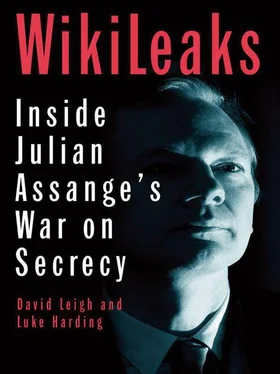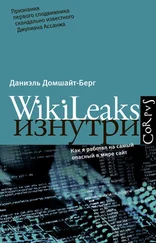Harding, Luke - WikiLeaks - Inside Julian Assange's War on Secrecy
Здесь есть возможность читать онлайн «Harding, Luke - WikiLeaks - Inside Julian Assange's War on Secrecy» весь текст электронной книги совершенно бесплатно (целиком полную версию без сокращений). В некоторых случаях можно слушать аудио, скачать через торрент в формате fb2 и присутствует краткое содержание. Жанр: Старинная литература, на английском языке. Описание произведения, (предисловие) а так же отзывы посетителей доступны на портале библиотеки ЛибКат.
- Название:WikiLeaks: Inside Julian Assange's War on Secrecy
- Автор:
- Жанр:
- Год:неизвестен
- ISBN:нет данных
- Рейтинг книги:3 / 5. Голосов: 1
-
Избранное:Добавить в избранное
- Отзывы:
-
Ваша оценка:
- 60
- 1
- 2
- 3
- 4
- 5
WikiLeaks: Inside Julian Assange's War on Secrecy: краткое содержание, описание и аннотация
Предлагаем к чтению аннотацию, описание, краткое содержание или предисловие (зависит от того, что написал сам автор книги «WikiLeaks: Inside Julian Assange's War on Secrecy»). Если вы не нашли необходимую информацию о книге — напишите в комментариях, мы постараемся отыскать её.
WikiLeaks: Inside Julian Assange's War on Secrecy — читать онлайн бесплатно полную книгу (весь текст) целиком
Ниже представлен текст книги, разбитый по страницам. Система сохранения места последней прочитанной страницы, позволяет с удобством читать онлайн бесплатно книгу «WikiLeaks: Inside Julian Assange's War on Secrecy», без необходимости каждый раз заново искать на чём Вы остановились. Поставьте закладку, и сможете в любой момент перейти на страницу, на которой закончили чтение.
Интервал:
Закладка:
6. (C/NF) Sarkozy is most prone to disappoint when, in his impatience for action, he effectively “gets ahead” of other key players and his own advisors. Sarkozy is firmly convinced that the most intractable diplomatic problems can only be solved by getting leaders together in person to cut through bureaucratic red tape and make bold decisions – hence his predilection for proposing summits. He has little patience for the incremental steps of diplomacy and once he latches onto an idea he is loath to let it go. Impatient for progress in the Middle East, he has sought ways to make France a player, first through creation of the UfM and second by championing a summit, either in the guise of the UfM or now through other partners (such as the U.S., the Quartet, etc) to achieve his goals. In another example, his surprise announcement last June in support of a new treaty on European security architecture took many allies, and his own staff, by surprise. Although that debate has been channelled into the OSCE Corfu process for the present, Sarkozy is already chafing at what he considers lack of progress on this strategic issue and is continuously tasking his staff to come up with new proposals to address the impasse of CFE, improve the partnership with Russia, and provide other ideas to overcome blocked initiatives.
PARIS 00001638 003 OF 004
NO ONE TO SAY “NO”
7. (C/NF) Sarkozy has few restraints – political, personal or ideological – to act as a brake on his global ambitions. Domestically, he rewards party leaders prepared to adopt his policies and marginalizes any opponents with a diverse view. Several “favored” cabinet ministers with high profiles early in his administration – including Rama Yade and Rachida Dati – were subsequently bumped into secondary jobs after having disagreed with Sarkozy. On the other hand, State Secretary for European Affairs, Pierre Lellouche, willingly muzzled his long-term outspoken support for Turkish Accession to the EU in exchange for his current post. While Diplomatic Advisor (NSA-equivalent) Jean-David Levitte remains a key player, with an extensive background in diplomacy and a calming personality, other advisors like Secretary General Claude Gueant are playing an increasingly public role. Despite having Sarkozy’s ear to various degrees, few appear to exercise any significant degree of influence over the activist president.
8. (C/NF) Sarkozy’s own advisors likewise demonstrate little independence and appear to have little effect on curbing the hyperactive president, even when he is at his most mercurial. Elysee contacts have reported to us the great lengths they will go to avoid disagreeing with him or provoking his displeasure – even recently reportedly re-routing the President’s plane to avoid his seeing the Eiffel Tower lit up in Turkey’s colors on the visit of PM Erdogan (a decision made by the Paris city hall). After two years in office, many seasoned key Elysee staff are leaving for prestigious onward assignments as a reward for their hard work, raising questions as to whether new faces will be any more willing to point out when the emperor is less than fully dressed.
WORKING TOGETHER IN THE FUTURE
9. (C/NF) When he was elected in 2007, Sarkozy was among the first French leaders to openly embrace the United States, despite a U.S. administration very unpopular in Europe at the time. This was due to Sarkozy’s conviction that France can accomplish more in cooperation with, rather than opposition to, the United States. When then-Senator and presidential candidate Obama came to France in July 2008, Sarkozy cleared his schedule to meet with him and further broke his own protocol rules and held a joint press conference (a privilege normally reserved exclusively for visiting heads of state). Sarkozy is prepared to be the U.S.’s key partner in Europe and is hoping for intense regular contact with President Obama (which enhances Sarkozy’s domestic stature and therefore directly increases his ability to make hard decisions). French journalists are pointing out with increasing frequency that Sarkozy has not paid a White House call on President Obama, and French officials are beginning to express concern over this perceived lack of high-level visits and other regular consultations. Journalists and officials alike are expressing the concern that France, and Europe as a whole, may be of less strategic importance to the United States today (a view that, all things being equal, does not enhance their incentives to work closely with us).
10. (C/NF) On strategic questions, Paris is frequently willing to back U.S. positions, even in the face of general European reluctance. Paris has welcomed U.S. efforts to “re-set” relations with Russia and has consistently emphasized developing a common approach with Washington toward Moscow. On Iran, President Sarkozy remains personally engaged and is willing to work intensely within Europe (both institutionally in the EU and through efforts to persuade individual countries to adopt national measures). On non-proliferation and disarmament issues, the GOF has urged regular consultations in the run up to the 2010 NPT Review Conference and launch of discussions on a FMCT treaty. The most important thing for French officials and Sarkozy himself is to feel like they are part of the decision-making process and not simply called in to ratify decisions after they have been made in Washington.
AFGHANISTAN: AN ILLUSTRATIVE CASE
PARIS 00001638 004 OF 004
11. (C/NF) Our effort to secure increased French contributions to Afghanistan underlines how much decision-making power is vested in the French president and how best we can work with him to achieve desired results. Last year, on our request, President Sarkozy went against all of his political and military advisors to deploy a French OMLT to assist the Dutch forces in Uruzgan, a critical reinforcement of a key ally. It was also Sarkozy alone who made the decision to deploy an additional 700 troops at last year’s Bucharest summit – at the time of the announcement, even key staff were still unsure what the final decision would be. This year, in intense exchanges with all the major French players including FM Kouchner, NSA-equivalent Levitte and French CHOD Georgelin, each one expressed support for U.S. policy but were doubtful about additional French financial or military resources, frequently citing Sarkozy’s earlier statement of “no additional troops.”
12. (C/NF) However, following a direct conversation with President Obama, President Sarkozy dropped the formerly firm “no” position and moved forward more quickly and proactively than we envisioned, opening the door to military reinforcements “in time” and promising increased financial and training assistance. Although the specifics are not yet provided, the personal outreach to President Sarkozy made the difference between getting a cautious bureaucratic response and a genuine commitment from a key ally when we needed it. The French press led their reports noting Sarkozy was the first foreign leader on Obama’s call sheet, thereby increasing the pressure on Sarkozy to respond favorably.
COMMENT
13. (C/NF) Comment: As one of Europe’s most politically secure leaders at the head of a country with significant ability to contribute more to global problem-solving across a broad front, from Afghanistan to climate change, economic stabilization, Iran, and the Middle East Peace Process, Sarkozy represents a key actor in the fulfillment of our shared policy goals. We will not always see eye-to-eye, and differences on key issues (such as non-proliferation and disarmament, which are seen as critical to French national interests) are looming. However, through enhanced consultation (including, and perhaps especially, at the highest levels), I believe we can address these differences, minimize unhelpful proposals and foster increased collaboration to better leverage French interests to fulfill ours. France is a like-minded country with a major economy and the second-largest deployed military and diplomatic forces in the world. By striking the right note in our bilateral relationship, we can leverage Sarkozy’s strengths, including his willingness to take a stand on unpopular issues, to be a major contributor to U.S. goals. We must also recognize that Sarkozy has an extraordinary degree of decision-making power which is vested in him alone as the French president. In my opinion it will necessitate periodic Presidential intervention to reassure Sarkozy of our commitment as an ally and partner and, in many cases, to close the deal. Sarkozy will remain a power to be reckoned with in France and a significant driver of Europe for the foreseeable future. It is clearly in our interest to work hard to channel his energy and initiatives into a constructive form of cooperation that enhances our ability to solve global issues together. End comment. RIVKIN
Читать дальшеИнтервал:
Закладка:
Похожие книги на «WikiLeaks: Inside Julian Assange's War on Secrecy»
Представляем Вашему вниманию похожие книги на «WikiLeaks: Inside Julian Assange's War on Secrecy» списком для выбора. Мы отобрали схожую по названию и смыслу литературу в надежде предоставить читателям больше вариантов отыскать новые, интересные, ещё непрочитанные произведения.
Обсуждение, отзывы о книге «WikiLeaks: Inside Julian Assange's War on Secrecy» и просто собственные мнения читателей. Оставьте ваши комментарии, напишите, что Вы думаете о произведении, его смысле или главных героях. Укажите что конкретно понравилось, а что нет, и почему Вы так считаете.












